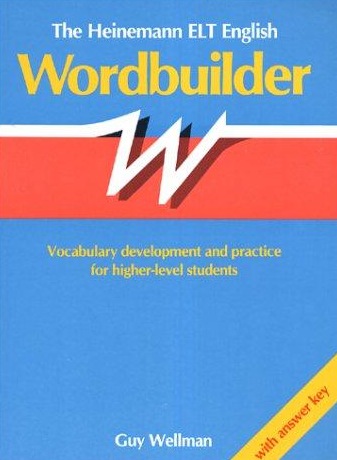December’s intuition post took me on a long and unintended trip down my own language-learning memory lane and brought back all sorts of recollections of the processes I went through as a language learner. Here’s a thought that’s been nagging at me over the past month:
How do I know the English I know today? How did I build up my own linguistic knowledge / competence / intuition?
Perhaps not surprisingly, I don’t have an answer to this question, since most of the fragments I can still recall form anything but a coherent whole.
One thing I do know, however: Most of my vocabulary learning was active rather than incidental (through reading, for example) and this is why Wordbuilder played such a key role in the whole process.
In the late 80s/early 90s, as a novice teacher, I was still far, far from happy with my own level of English (even though I’d already passed the CPE), so, week after week, I’d spend hours on end visiting bookshops and scouring the shelves for something that could help me continue to improve my language skills.
 One day, I stumbled upon a fairly thick and visually unappealing book, with a fairly descriptive name: Wordbuilder. Way back then, there were nowhere near as many good titles available as there are today, so I said to myself, “Why not?”, fearing deep inside, though, that I would eventually tuck the book away in some dusty corner of a shelf and soon forget I’d ever bought it.
One day, I stumbled upon a fairly thick and visually unappealing book, with a fairly descriptive name: Wordbuilder. Way back then, there were nowhere near as many good titles available as there are today, so I said to myself, “Why not?”, fearing deep inside, though, that I would eventually tuck the book away in some dusty corner of a shelf and soon forget I’d ever bought it.
I was wrong.
In hindsight, I’m not afraid to say that I began to “sound advanced” in English by studying -make that devouring – Word builder. The book was made up of short, self-contained lessons organized around themes and packed with examples of words, phrases and sentences pertaining to different themes. My goal was to cover one lesson every two days, which I usually managed to do. Then, at the end of each week, I would review the old stuff and try to put the new lexis in circulation by creating real sentences.
I don’t know what it is about Wordbuilder that struck such a chord with me and made the target lexis so memorable, but I am indebted to Guy Wellman (who also co-wrote “Longman Advanced English”, which I’d used as an advanced student a few years earlier) for helping me break through what, in hindsight, could have been some sort of nearly insurmountable “low-advanced” plateau.
In hindsight, it’s probably fair to say that I could’ve done with a little more help with usage and collocation – especially collocation. But given what was known about phraseology vs. pedagogy at the time, the book was the best it could have been.
I suspect Wordbuilder is out of print, but here’s a PDF file to give you a taste of what the book looks like (no printing or photocopying, PLEASE!).
If by any chance, however, you get your hands on this gem, consider buying it. Who knows it might help you the way it helped me.
Thanks for reading.




I really enjoyed your post.
Your writing flows, is interesting and feels so natural.
Difficult to believe that you ever had a restricted vocabulary.
I teach English in Taiwan and I am impressed with the path you have taken and your advice will be useful and inspiring to my students.
Thanks
Theo
Thank you for your kind words, Theo. They mean a lot to me.
Just to check out if the blog died and to say that I was able to put my hands on this book. Digitally, if you know what I mean.
Ricardo,
The blog will never die. There WILL be very slow periods, though.
I saw the book for sale at Martins Fontes on Brigadeiro Luis Antonio. Why don’t you buy the printed version?
Hello! I have recently purchased this book (just under 15 EUR) and I love it! I am really happy to find there is someone as enthusiast about it as I am :). Greetings from Romania!
Dear Claudia,
I hope you learn as much from this book as I did. Thanks for stopping by!
i downloaded this book.it is not as good as english vocabulary in use advanced from cambridge university press which contains more detailed explanations. greetings from Greece!
Hi Stergio,
English Vocabulary is Use is an excellent book, but I don’t know it well enough to recommend it. Besides, I write for a major international publisher, and it would be awkward to promote a book published by a competitor. Heinemann no longer exists, so that’s less of a problem. 🙂
Hi Luiz,
This sentence of you is so me “In the late 80s/early 90s, as a novice teacher I was still far, far from happy with my own level of English (even though I’d already passed the CPE)”, but in my case I’m at 2010s and the certificate is CAE.
Sometimes I get really frustrated of not getting the level I expect and the level I see some famous names of ESL world I know from FB communities. 🙁 I have the feeling that I’m always behind and I never know how to speak or write naturally like them.
As Sergios (above) ,I also enjoy the EVU, but I liked Worldbuilder, because it’s in a text style and contextualized even more then EVU.
Thank you for this post, to make me feel that although there is a long path away I can’t give up and I’m not far different from someone like you was and to provide de pdf of the book.
Cheers!
Juliana,
You’re right. You can’t give up. The CAE – CPE transition is not always an easy one, but with the right sort of attitude, enough time to dedicate yourself to the language and some to give you ongoing feedback, I’m sure you’ll get there.
Um abraço
Luiz